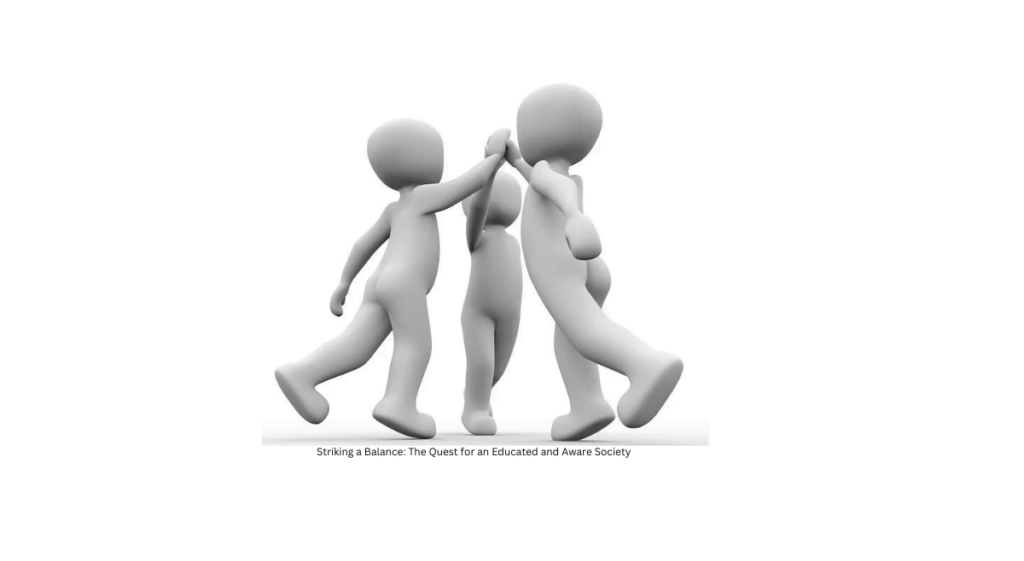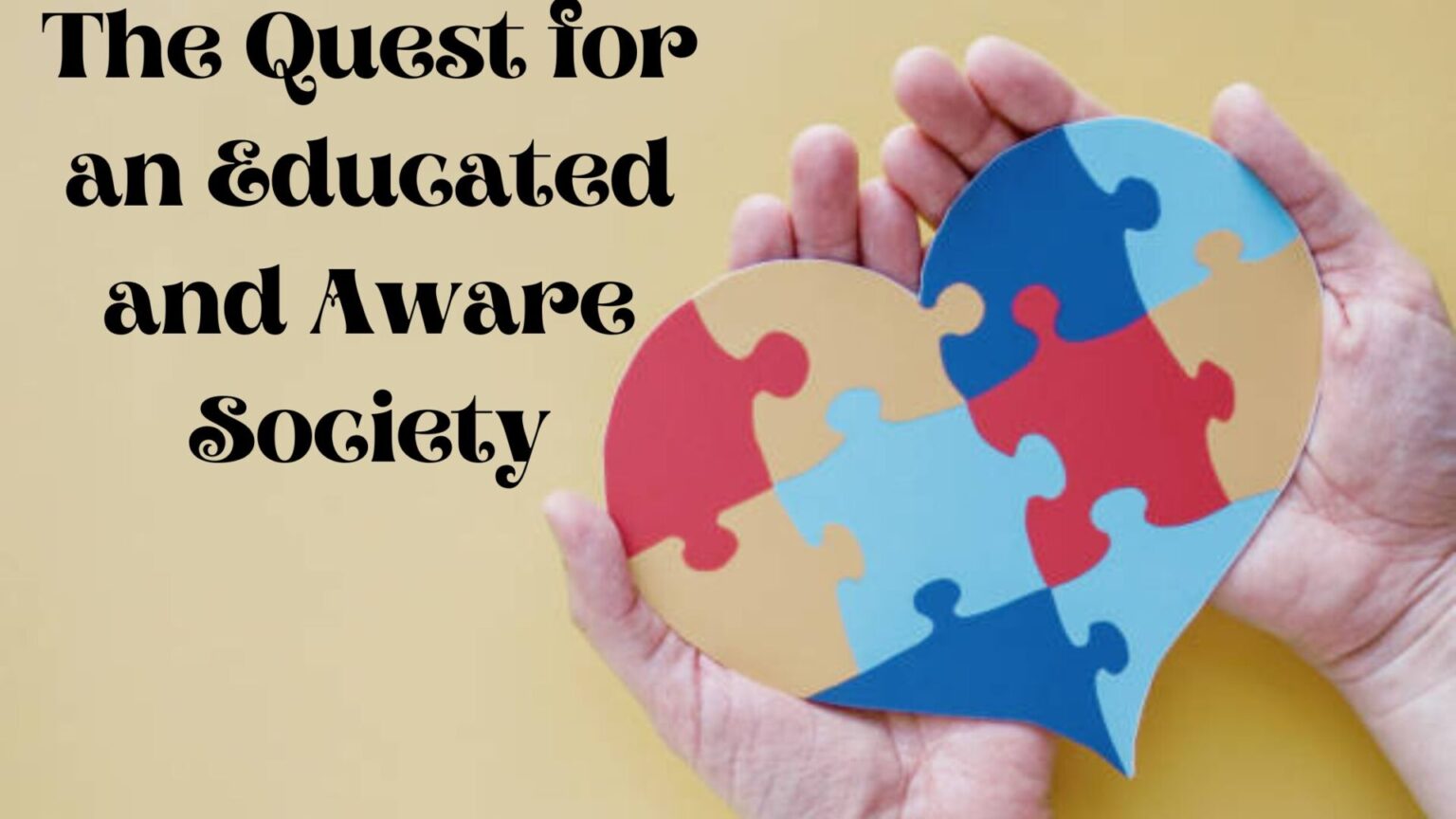Introduction
Striking a Balance: The Quest for an Educated and Aware Society

In our rapidly changing world, the quest for an educated and aware society has never been more critical. Education and awareness are two distinct yet interrelated pillars of personal and societal development. Striking a balance between these two elements is not just desirable but imperative for a healthier, more harmonious world. This article explores the importance of finding this balance, emphasizing the potential for positive change when both education and awareness are valued at the societal level.
The Dual Nature of Progress(The Quest for an Educated and Aware Society)
Progress in society has often been measured by advancements in education. Access to quality education is a fundamental right and a cornerstone of modern civilization. It equips individuals with knowledge, skills, and critical thinking abilities necessary to navigate an increasingly complex world. Formal education systems, from schools to universities, have long been at the forefront of societal development.
However, the quest for progress isn’t limited to education alone. Awareness, sometimes referred to as consciousness or mindfulness, complements education by focusing on the social, ethical, and emotional dimensions of human development. It emphasizes empathy, social responsibility, and a deeper understanding of the world and the people in it.
The Importance of Education
Education, in its traditional sense, plays a pivotal role in individual and societal growth. Here’s why it’s vital:

- Knowledge and Skill Acquisition: Education imparts knowledge and skills that drive innovation, economic development, and technological advancement.
- Empowerment: It empowers individuals to make informed choices, express themselves, and pursue meaningful careers.
- Cultural Preservation: Education preserves cultural heritage and fosters appreciation for diversity.
- Critical Thinking: It cultivates critical thinking and problem-solving abilities, which are essential for addressing complex global challenges.
The Importance of Awareness
Awareness, on the other hand, focuses on human values, ethics, and emotional intelligence. Here’s why it’s equally crucial:
- Empathy and Compassion: Awareness fosters empathy, compassion, and the ability to relate to others’ experiences, promoting harmonious relationships.
- Social Responsibility: It encourages a sense of social responsibility, motivating individuals to contribute positively to their communities.
- Mental Well-Being: Awareness practices like mindfulness can enhance mental well-being, reducing stress and promoting emotional resilience.
- Global Perspective: It encourages a global perspective, helping individuals understand the interconnectedness of the world and the impact of their actions.
Striking the Balance
To build a truly progressive society, we must strike a harmonious balance between education and awareness. Here’s how achieving this equilibrium can lead to positive change:
- Empowered Change-makers: Education equips individuals with the knowledge and skills needed to address real-world issues. When paired with awareness, it enables them to become empathetic and socially responsible change-makers who drive positive societal change.
- Informed Decision-Making: Education helps individuals make informed decisions, while awareness ensures that these decisions consider ethical and moral implications. Informed, ethical choices lead to a more just and equitable society.
- Social Cohesion: Awareness fosters understanding, respect, and empathy among diverse groups within society. When combined with education that promotes diversity and inclusion, it contributes to social cohesion and reduces prejudices and discrimination.
- Sustainable Development: The balance between education and awareness is crucial for sustainable development. Education equips individuals with the knowledge to address environmental challenges, while awareness encourages sustainable lifestyles and responsible consumption.
- Mental Health and Well-being: Education can be stressful, but awareness practices such as mindfulness and emotional intelligence can mitigate the negative effects. A balance between the two promotes mental well-being among individuals and society at large.
- Crisis Response: In times of crisis, such as natural disasters or pandemics, an educated population can make informed decisions about safety and healthcare. Awareness ensures that these decisions also consider the needs and well-being of others, fostering a sense of solidarity.
- Global Citizenship: An educated and aware society is more likely to embrace global citizenship. It understands its role in the global community, respects international agreements, and works collaboratively to address global challenges.
Challenges in Striking the Balance
While the benefits of balancing education and awareness are evident, several challenges must be addressed:
- Education Quality: Ensuring that education is of high quality and equitably accessible to all is a significant challenge in many parts of the world.
- Standardized Testing: Overemphasis on standardized testing can undermine the holistic development of students, neglecting awareness-related skills.
- Awareness Gaps: Awareness practices often lack standardized curricula, making them less accessible in formal education systems.
- Resource Allocation: Balancing resources between education and awareness initiatives can be challenging for governments and institutions.
- Resistance to Change: Traditional educational models may resist integrating awareness-based practices.
“What are the advantages and positive outcomes that individuals can experience when they possess both education and awareness?“
Individuals who possess both education and awareness can experience a wide range of advantages and positive outcomes that contribute to their personal development and their ability to positively impact society. Here are some key advantages:

- Informed Decision-Making: Having education provides individuals with the knowledge and critical thinking skills to make well-informed decisions. Awareness, on the other hand, ensures that these decisions consider ethical, moral, and societal implications. Together, they enable individuals to make choices that align with their values and have a positive impact.
- Holistic Personal Growth: Education and awareness together contribute to holistic personal growth. Education provides cognitive and intellectual development, while awareness nurtures emotional and social intelligence. This combination leads to well-rounded individuals who excel in various aspects of life.
- Problem-Solving and Adaptability: Education equips individuals with problem-solving skills and adaptability. When paired with awareness, they are better equipped to address complex, real-world issues that require not only technical knowledge but also an understanding of the human and ethical dimensions of a problem.
- Social Responsibility: Awareness encourages a sense of social responsibility. Individuals who are aware of the needs and challenges of their communities are more likely to engage in volunteer work, charitable activities, or advocacy for social causes. Education amplifies their ability to contribute effectively.
- Reduced Prejudices and Discrimination: An educated and aware individual is less likely to hold prejudices and engage in discriminatory behavior. They understand the value of diversity and inclusivity, fostering a more tolerant and inclusive society.
- Enhanced Communication Skills: Education enhances communication skills, while awareness improves interpersonal communication by promoting active listening, empathy, and effective conflict resolution. This combination leads to better personal and professional relationships.
- Leadership and Influence: Educated and aware individuals often become influential leaders in their communities, organizations, or fields. They can inspire positive change, make ethical decisions, and lead with empathy and vision.
Conclusion
Striking a balance between education and awareness is a complex but necessary endeavor for creating a healthier, more harmonious society. Education equips individuals with knowledge and skills, while awareness fosters empathy, social responsibility, and emotional intelligence. Together, they create informed, ethical, and empathetic change-makers who drive positive societal change. Addressing challenges in achieving this balance is crucial for a more equitable and sustainable future. As we progress, let us remember that an educated and aware society has the power to transform the world for the better.
FAQs
1. What is “Striking a Balance: The Quest for an Educated and Aware Society”?
“Striking a Balance” is a metaphorical exploration of the pursuit of equilibrium between education and awareness within society. It delves into the interconnectedness of these concepts and their impact on fostering a well-informed and engaged populace.
2. How does education contribute to societal balance?
Education serves as the foundation for critical thinking, problem-solving, and informed decision-making, which are essential for maintaining equilibrium in society. By providing individuals with knowledge and skills, education empowers them to contribute meaningfully to their communities and adapt to changing circumstances.
3. What role does awareness play in societal equilibrium?
Awareness encompasses understanding of current events, social issues, and broader global challenges. It enables individuals to comprehend the implications of their actions, empathize with others, and participate in constructive dialogue. A heightened awareness fosters a sense of responsibility towards collective well-being, contributing to a balanced society.
4. How can individuals and institutions promote an educated and aware society?
Individuals can prioritize lifelong learning, engage in diverse perspectives, and actively seek information from credible sources. Institutions, including educational establishments, media organizations, and policymakers, play a vital role in fostering a culture of learning, transparency, and civic engagement. Collaboration among stakeholders is essential for nurturing an environment conducive to continuous education and awareness.
5. What are the challenges in achieving societal balance?
Challenges include disparities in access to quality education, misinformation, apathy, and polarization. Addressing these issues requires concerted efforts to promote equitable educational opportunities, combat misinformation, cultivate media literacy, and foster inclusive dialogue across diverse communities.
References
- UNESCO. (2015). Education for All 2000-2015: Achievements and Challenges.
- Kahneman, D. (2011). Thinking, Fast and Slow. Farrar, Straus and Giroux.
- Dewey, J. (1916). Democracy and Education: An Introduction to the Philosophy of Education. The Free Press.
- Pew Research Center. (2020). Americans’ Views on Misinformation and Disinformation.






